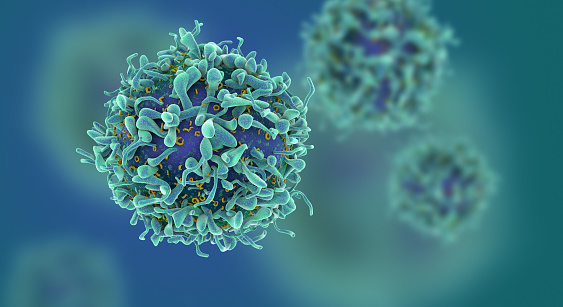
Another large drug company is getting into an emerging field of cancer immunotherapy with the announcement of a partnering deal with a Chinese company.
Chicago-based drugmaker AbbVie said Friday that it had entered a global partnership with Shanghai-based I-Mab Biopharma. Under the deal, I-Mab will receive an upfront payment of $180 million, along with a $20 million milestone payment based on Phase I results for the drug, lemzoparlimab, a monoclonal antibody that targets CD47. I-Mab will also be eligible to receive milestones of up to $1.74 billion, $840 million of which come from clinical development and regulatory approval.
Shares of I-Mab were up 11.15% on the Nasdaq soon after markets opened Friday. The company is running a Phase I study of the drug in relapsed or refractory advanced solid tumors and lymphoma, as a single agent and in combination with Merck’s Keytruda (pembrolizumab) or Roche’s Rituxan (rituximab). AbbVie said the deal also creates the potential to explore combinations of lemzoparlimab with Venclexta (venetoclax), a small-molecule BCL-2 inhibitor.
“The addition of I-Mab’s novel CD47 programs complements our global clinical strategy in hematology and immuno-oncology,” AbbVie chief science officer Thomas Hudson said in a statement. “We have been impressed with what I-Mab has been able to accomplish in research and clinical development, and we look forward to working together to make a meaningful difference in the lives of millions of patients globally.”
AbbVie noted that lemzoparlimab, which also carries the development name TJC4, is designed to limit inherent binding to red blood cells while preserving anti-tumor activity and that it showed a potentially better safety and pharmacokinetics profile in Phase I topline results.
CD47 is also known as the “don’t eat me” signal and is expressed by normal cells, but also overexpressed by cancer cells, thereby enabling them to evade the immune system. Targeting the CD47/SIRPa axis works by using the antibody to target CD47 on cancerous cells and enabling myeloid cells to attack and kill them via their corresponding receptor, SIRPa. By contrast, most cancer immunotherapy drugs on the market work by inhibiting immune checkpoints like PD-1, PD-L1 and CTLA4.

A Deep-dive Into Specialty Pharma
A specialty drug is a class of prescription medications used to treat complex, chronic or rare medical conditions. Although this classification was originally intended to define the treatment of rare, also termed “orphan” diseases, affecting fewer than 200,000 people in the US, more recently, specialty drugs have emerged as the cornerstone of treatment for chronic and complex diseases such as cancer, autoimmune conditions, diabetes, hepatitis C, and HIV/AIDS.
In March, Gilead Sciences spent $4.9 billion to acquire one of the leading companies in the anti-CD47 drug space, Forty Seven. Shortly thereafter, the company’s lead drug candidate, magrolimab, showed positive Phase Ib results in data presented at the American Society of Clinical Oncology’s annual meeting among patients with acute myeloid leukemia and myelodysplastic syndrome.
Photo: CGToolbox, Getty Images













